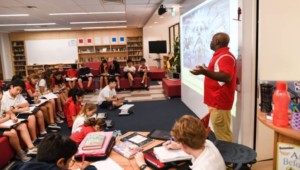..But What Are They Learning? 3 Tips for Deeper Learning

It’s here. Aromas of pumpkin and apple fill the air as even the leaves changes their wardrobe. It’s autumn. School is in full swing with all its accoutrements and that means we’ve moved from wide-eyed optimism to the in-the-trenches daily grind. Our lesson planning shifts from big, broad brushstrokes that encompass entire months to the far less glamorous tedium of making it through any given day. The plans we wrote in August are completely useless (everything has changed… again) and we’re trying to figure out how, in such a short amount of time, we’re behind the ball again.
In a recent conversation with my friend Nancy, she made the statement, “We’re really good at planning activities, but how are we doing when it comes to planning learning?” I think this gets the heart of what’s happened. We’ve planned our activities to get the school year started, but now we’re realizing that the learning we hoped would take place, well, it isn’t. At least not like we hoped it would. So we tutor and ask students to stay after school or eat their lunch in your room so you can work with them or send letters home or all of the above. These are great things, but they’re all reactive. How can we get in front of these issues? How can we move from planning activities, to planning learning?
1 – Stephen Covey was on to something: Begin with the end in mind. What is it that students will do at the end of your unit/lesson/activity? Once you know where they’re headed, you can start to identify the steps to get them there. This means you always start with the learning outcome before you even think about the activity. Common sense? Maybe. But it’s far too easy to hear about something another teacher did and want to port it over to your room without considering the implications to your own curriculum. The same holds true (maybe especially so) for “technology lessons” where you force-fit your lesson into a given tool (app/website/resource) without considering exactly how that activity will lead students to mastery of the topic at hand. This is old (very old) advice, but one that is quickly left behind in our zealous pursuit of engagement.
2 – Design for learning, not engagement. Engagement can only take you so far. The pursuit of engagement is a lot like this. You’re always on the hunt for the next trick, the next ‘thing,’ the next app, the next website. It’s exhausting! There’s nothing wrong with keeping things fresh and new (you should!) but not for its own sake and certainly not in isolation. There are more resources today that are designed to drive student learning than ever before and our access to more information has become essentially unlimited. It’s time, then, to pair these new tools with a well-designed lesson that seeks deep learning from the start. Deep learning is inherently engaging. If you design a lesson for engagement, you’ll get neither engagement nor learning. If you design a lesson for metacognitive deeper learning, you’ll get both.
3 – Put students in charge of their own learning. Students should always be able to articulate what they’re learning, how the current activity is developing mastery of that topic, and how they’ll apply their learning to other (seemingly unrelated) situations. It is this last point (often known by its sexier title: divergent thinking) that truly makes a difference in student learning. Far too often, students are stumped when a question is posed in such a way that they must depart the path on which they learned in order to blaze a new trail, one that aggregates learning from a variety of sources to develop a new path to understanding. Put another way, they only memorized the rules, they never fell in love with the idea. It’s time to flip the script and develop systems where students can track their own progress (and no, a grade in a gradebook just doesn’t do it). When students are aware (metacognition) of their own learning journeys (where they are, where they’re headed, and how they’ll get there), suddenly it isn’t about grades, games, activities, or tests: it’s about education.
Whether you’re a classroom teacher, an instructional coach, school district administrator, or even an entrepreneur looking to support instruction, I implore you to ask (at least reflectively): but what are they learning?
For more on Deeper Learning, check out the Getting Smart Deeper Learning Page






0 Comments
Leave a Comment
Your email address will not be published. All fields are required.